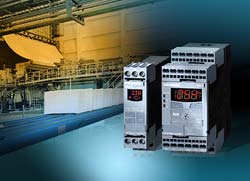Reliable protection for motors and plant components thanks to monitoring relays with IO-Link interface

The relays communicate with the control level via IO-Link to transfer, for example, measured values and messages. The Sirius 3UG48 monitoring relays for electrical and mechanical measurements monitor the observance of parameterizable limits for speed, network quality, current, power factor (cos phi) or voltage.
The Sirius 3RS14 and 3RS15 temperature monitoring relays have between one and three resistance sensors or thermocouples for controlling temperatures from -99 to +1,800 degrees Celsius, and can also be used for simple control tasks . The new monitoring relays can also fulfill their monitoring tasks reliably without an IO-Link connection to a controller.
Connecting the new Sirius relay via an IO-Link to the control level facilitates efficient, central parameter assignment as well as detailed fault localization and diagnostics. This simplifies commissioning and maintenance. The devices have several LEDs and a display for showing actual values and can be used directly in the control cabinet for diagnostic purposes. The values are also displayed in the central control system via the IO-Link for simple further processing. The new Sirius relays are parameterized either directly at the device or from the central control system via the IO-Link.
Data synchronization with the higher-level control system ensures that the system documentation is up-to-date at all times. New parameters are automatically assigned by a parameter server, which makes it considerably easier to replace any devices. For efficient energy management, the Sirius relays 3UG48 also support the data formats defined in the Profienergy profile.
IO-Link is a communication standard for uniformly linking sensors and switching devices to the control level by means of a cost-effective, point-to-point connection. IO-Link facilitates central fault localization and diagnostics down to sensor/actuator level, and simplifies commissioning and maintenance, because parameter data can be dynamically changed directly from the application. This helps to increase plant availability and lower engineering expenditure. As an open interface, IO-Link can be integrated into all conventional fieldbus and automation systems.
The Siemens Industry Sector (Erlangen, Germany) is the worldwide leading supplier of environmentally friendly production, transportation and building technologies. With integrated automation technologies and comprehensive industry-specific solutions, Siemens increases the productivity, efficiency and flexibility of its customers in the fields of industry and infrastructure. In fiscal 2010, which ended on September 30, 2010, revenue from continuing operations of the Industry Sector (excluding Osram) totaled around €30.2 billion. At the end of September 2010, Siemens Industry Sector had around 164,000 employees worldwide without consideration of Osram. Further information is available on the Internet at: http://www.siemens.com/industry
The Siemens Industry Automation Division (Nuremberg, Germany) is a worldwide leader in the fields of automation systems, industrial controls and industrial software. Its portfolio ranges from standard products for the manufacturing and process industries to solutions for whole industrial sectors that encompass the automation of entire automobile production facilities and chemical plants. As a leading software supplier, Industry Automation optimizes the entire value added chain of manufacturers – from product design and development to production, sales and a wide range of maintenance services. With around 33,000 employees worldwide (September 30), Siemens Industry Automation posted sales of €6.2 billion in fiscal year 2010. http://www.siemens.com/industryautomation
Reference Number: IIA2011092516e
Contact
Mr. Gerhard Stauss
Industry Automation Division
Siemens AG
Gleiwitzerstr. 555
90475 Nürnberg
Germany
Tel: +49 (911) 895-7945
gerhard.stauss@siemens.com
Media Contact
More Information:
http://www.siemens.com/siriusAll latest news from the category: Machine Engineering
Machine engineering is one of Germany’s key industries. The importance of this segment has led to the creation of new university degree programs in fields such as production and logistics, process engineering, vehicle/automotive engineering, production engineering and aerospace engineering among others.
innovations-report offers informative reports and articles covering technologies such as automation, motion, power train, energy, conveyor, plastics, lightweight construction, logistics/warehousing, measurement systems, machine tools and control engineering.
Newest articles

NASA: Mystery of life’s handedness deepens
The mystery of why life uses molecules with specific orientations has deepened with a NASA-funded discovery that RNA — a key molecule thought to have potentially held the instructions for…

What are the effects of historic lithium mining on water quality?
Study reveals low levels of common contaminants but high levels of other elements in waters associated with an abandoned lithium mine. Lithium ore and mining waste from a historic lithium…

Quantum-inspired design boosts efficiency of heat-to-electricity conversion
Rice engineers take unconventional route to improving thermophotovoltaic systems. Researchers at Rice University have found a new way to improve a key element of thermophotovoltaic (TPV) systems, which convert heat…



